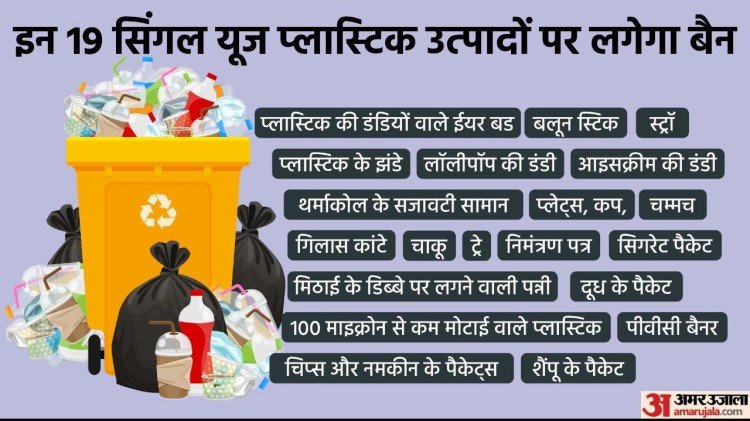hear the news
Expansion
From July 1, the government is going to completely ban the use of single-use plastic in the country. It has been said by the government to completely ban the products made from single use plastic across the country. There will be a complete ban on manufacturing, selling, storing, filling, selling and exporting these products after June 30. Sources associated with the government say that the government has taken this step with the aim of reducing the ill-effects of single-use plastic waste on the environment.
What is single use plastic?
As the name suggests, ‘single use plastic’ are those forms of plastic which we use only once and throw them away. The things that the government is going to ban include about 19 types of products, including plastic used in food packaging, straws used with soft drinks, plastic sticks in balloons, sticks with candy. , cup-plates made of thermocol, plastic glasses and plastics used for packaging of milk and shampoo, as well as all plastic items less than ten microns.
Single use plastic is used in everything from milk to shampoo
At present, single use plastic is being used on a large scale in the packaging industry in the country. From time to time, many states of the country have made provisions to ban the use of these plastics, but the truth is that even now more than 90 percent of the food items in the country are packaged in single use plastic and reaching the consumers. Single-use plastic is being used on a large scale in products related to milk, oil, soap, shampoo, chocolate and soft drinks.
Products of companies like Amul and Dabur will also be affected
The products of well-known companies like Amul, Parle Agro, Mother Dairy, Dabur will also be affected due to the discontinuation of single-use plastic. After the announcement of ban on single use plastic from July 1, the industries of the country have also demanded from the government to extend its deadline. A company like Amul had also written to the government requesting it to defer the decision. However, the government has so far not expressed any intention to stop the decision.
Import of paper straws started
Meanwhile, many companies have started importing paper straws instead of plastic straws so that they can provide paper straws with their products to the customers, although the companies are finding it much more expensive than single use plastic. Industry experts believe that paper straws are up to four times more expensive than plastic straws.
Why is single use plastic dangerous?
Single use plastics are very dangerous for our environment. The biggest problem with this plastic is that it cannot be decomposed nor can it be burnt. Their wastes release toxic chemicals, which are dangerous for humans and animals. Single use plastic waste prevents rain water from going under the ground, due to which the water level is also badly affected. In many parts of the world, a large population is facing water crisis due to single use plastic. Animals and marine fish are losing their lives on a large scale due to swallowing of single-use plastics.
These 19 single use plastic products will be banned
1. Ear buds with plastic sticks, 2. Balloon sticks, 3. Plastic flags and lollipop sticks, 4. Ice cream sticks, 5. Thermocol decorations, 6. Plates-cups, 7. Glass-forks, 8 . Spoon, 9. Knife, 10. Straw, 11. Tray, 12. Sweet Box Foil, 13. Invitation Card, 14. Cigarette Packet, 15. Plastic Less Than 100 Microns Thickness, 16. PVC Banner 17 Packets of Milk, 18. Packets of Shampoo, 19. Packets of Chips and Namkeen
CSE says list of banned single use plastic is inadequate
However, questioning the single-use plastic ban, green think-tank Center for Science and Environment (CSE) has said that the list of single-use plastic products that the government is banning from July 1 is not comprehensive as it involves multi-layer packaging. Packaging used is not included. CSE has said that in terms of plastic pollution, the biggest threat to the environment is from such plastics. In such a situation, the government should make the list of banned single use plastic products more comprehensive.







